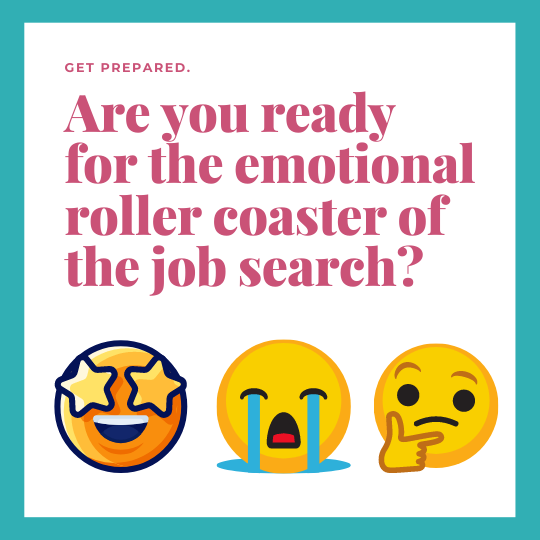Additional menu
Are you ready for the emotional roller coaster of the job search?

When people find out I do career coaching, they always ask about resumes and networking. The piece no one likes to talk about is the emotional aspect of the job search. It’s the part that can make or break your job search, how you perform in interviews, and if you land the job.
Your emotions during the job search directly impact your action – or lack of action. I can ask you to review my resume but how can I ask you to review my feelings? The first step to preparing for this emotional roller coaster to acknowledge that you’re about to hop on the ride.
Jem, Jem is Excitement!
Excitement is great! Excitement feels good. Excitement is the thing that you want to share with everyone during a job search. Excitement sounds like this.
“I’m so excited about the next chapter in my career!”
“I’m excited about the new opportunities ahead!”
“I’m excited to about this trying something new!”
Action: When you’re excited, you want to ride that wave of positive energy to propel your job search. Take advantage and enjoy this wonderful feeling.
Depression
Depression is negative. It’s ugly. It’s shame. It’s the emotion you don’t want to share with others during the job search. It slows you down and sucks your energy. The longer it lingers and the more you hide it, the larger it gets. During the job search, depression sounds like this in your head.
“I’ve applied for 35 jobs online and not gotten a single response. Why isn’t anyone responding?”
“I’ve had three interviews but not getting the job offer. What did I do and say wrong?”
“Maybe I should just stay where I am. (if you’re currently employed)”
“At this rate, I’ll never find a new job.”
When you’re depressed, you want to crawl under a rock and hide. The last thing you want to do is go apply online, call recruiters, and network with people. When you’re not feeling great, you don’t want the world to know. Unfortunately, during the job search, every moment matters. If you’re unemployed without income, every moment equals a dollar lost and possibly another dollar of unexpected debt.
Action: Get support. Share. It’s counterintuitive but sharing your feelings of depression and self-doubt actually helps. First, just the act of communicating with someone else reminds you that you’re not alone. It’s easy to get into a negative downward spiral when you’re having woe-is-me conversations with yourself. Once you discuss your feelings, you’ll start processing and acknowledging them.
Overwhelm and Confusion
I lumped these two together because the job search process can be confusing which leads to feeling overwhelmed. Do you know anyone that is a professional job searcher? Do you know anyone that changes job non-stop and does that for a living?
When I changed four jobs in 18 months, I felt I was as close to a professional job searcher as it got. Those intense job searching experiences in such a short time became the catalyst for Coach Caroleen. My friends and colleagues looked at me as the job search expert but I sure didn’t start out that way.
It took me almost two years to make my first successful career transition. My resume looked like dog barf. I shared a terrible version of my story that focused on my past (not future) and used all kinds of insider technical jargon that no one understood. Recruiters wouldn’t give me the time of day.
I felt so overwhelmed with the entire job search. I didn’t know where to start. I didn’t know what to do. I kept spinning my wheels doing tons of busy work – applying online, calling recruiters, tons of phone interviews – but never closing the deal (getting the job!). I was exhausted.
Action: So what changed? How did I break out of the negative cycle and get to where I am today?
1. I hired a professional HR consultant to advise on my resume. After revamping my resume countless times, I created a repeatable process for others to follow with 3 Day Resume.
2. I hired a career coach, much like what I do now for others, to help guide me during my job search.
3. I asked for help from my personal network. I looked to others that had recently successfully transitioned jobs and asked what worked for them. I did a lot of research. It’s the engineer in me.
4. I practiced and did the work. I did everything my HR consultant and career coach told me to do. I did all of my homework. I wrote the various versions of my resume. When recruiters gave me resume feedback, I took it to heart and made edits quickly. I practiced and got better at sharing my story. I used the research from my friends that succeeded and made subtle adjustments in my own job search process.
The truth is that job searching is an emotionally volatile and draining roller coaster. There’s really no way to avoid these emotions. There is a way to prepare yourself and take action when you feel these emotions. Be aware when the feelings come on and then take pause before you react.
Keep an eye out for part two of navigating emotions when I share more about confidence, anxiety, and stress.
